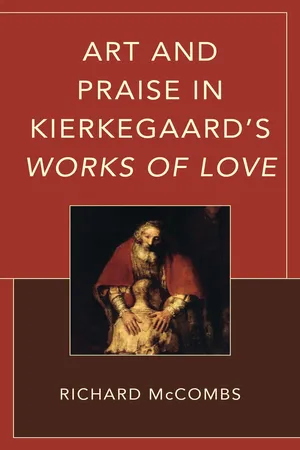
- 195 pages
- English
- PDF
- Available on iOS & Android
eBook - PDF
Art and Praise in Kierkegaard’s Works of Love
About this book
Since art is essential to the love of one's neighbor as oneself and to love's chief goal of building up one another, we cannot understand love without also understanding its art. Observing that praise is ubiquitous in Søren Kierkegaard's writings, Richard McCombs interprets Kierkegaard's Works of Love as a eulogy of love's arts of forgiveness, peace-making, and building up one's neighbor in maturity and charity. Kierkegaard stresses love's ability to achieve results, calling love irresistible and almost magical in overcoming obstacles to its purposes; living the life of faith and love involves skillful attention to the specificity of the episodes in an individual's life, and the creative imagining of new ways of enacting these virtues. McCombs argues that Kierkegaard's ideas about the art of love reveal limits or exceptions to his individualism and to his anti-consequentialism in ethics. Art and Praise in Kierkegaard's Works of Love explores Kierkegaard's distinct praises of love through texts like Works of Love, The Brothers Karamazov, and Middlemarch to illustrate, complement, and sometimes correct Kierkegaard's profound account of love's art and wisdom, suggesting ways that the art of praise bears on other questions in aesthetics, ethics, and religion.
Frequently asked questions
Yes, you can cancel anytime from the Subscription tab in your account settings on the Perlego website. Your subscription will stay active until the end of your current billing period. Learn how to cancel your subscription.
At the moment all of our mobile-responsive ePub books are available to download via the app. Most of our PDFs are also available to download and we're working on making the final remaining ones downloadable now. Learn more here.
Perlego offers two plans: Essential and Complete
- Essential is ideal for learners and professionals who enjoy exploring a wide range of subjects. Access the Essential Library with 800,000+ trusted titles and best-sellers across business, personal growth, and the humanities. Includes unlimited reading time and Standard Read Aloud voice.
- Complete: Perfect for advanced learners and researchers needing full, unrestricted access. Unlock 1.4M+ books across hundreds of subjects, including academic and specialized titles. The Complete Plan also includes advanced features like Premium Read Aloud and Research Assistant.
We are an online textbook subscription service, where you can get access to an entire online library for less than the price of a single book per month. With over 1 million books across 1000+ topics, we’ve got you covered! Learn more here.
Look out for the read-aloud symbol on your next book to see if you can listen to it. The read-aloud tool reads text aloud for you, highlighting the text as it is being read. You can pause it, speed it up and slow it down. Learn more here.
Yes! You can use the Perlego app on both iOS or Android devices to read anytime, anywhere — even offline. Perfect for commutes or when you’re on the go.
Please note we cannot support devices running on iOS 13 and Android 7 or earlier. Learn more about using the app.
Please note we cannot support devices running on iOS 13 and Android 7 or earlier. Learn more about using the app.
Yes, you can access Art and Praise in Kierkegaard’s Works of Love by Richard McCombs in PDF and/or ePUB format, as well as other popular books in Philosophy & European Literary Criticism. We have over one million books available in our catalogue for you to explore.
Information
Table of contents
- Cover
- Contents
- Acknowledgments
- List of Abbreviations
- Introduction
- The Poetry of Faith in Fear and Trembling
- Love’s Art of Upbuilding
- The Arts of Forgiveness, Reconciliation, and Peace-Making
- The Art of Praising Love
- Two Examples of Praising Love
- Love’s Equality
- Conclusion
- Appendix
- Bibliography
- Index
- About the Author